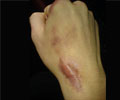Researchers have used the natural glue to devise a new way to make medical adhesives that can hold key to faster healing from surgeries.
Researchers have used the natural glue to devise a new way to make medical adhesives that can hold key to faster healing from surgeries.
It is the glue that marine mussels use to stick to rocks, and a variation on the inkjet printer.The North Carolina State University researchers say that the their technique may help replace traditional sutures, and lead to faster recovery times and increased precision for exacting operations like eye surgery.
Sutures and synthetic adhesives have been in use for joining tissue together in the wake of a surgery.
Though sutures work well, they require enormous skill and longer operating times. Their use is also associated with a number of surgical complications, including discomfort, infection and inflammation.
Synthetic adhesives, though widely used, are the source of increasing concerns over their toxicological and environmental effects.
Since non-biodegradable synthetic medical adhesives do not break down in the body, they may lead to medical problems.
Advertisement
Dr. Roger Narayan, one of the authors of the study, says that the mussel proteins can be placed in solution and applied using inkjet technology to create customized medical adhesives, which may have a host of applications.
Advertisement
"This is an improved way of joining tissues because the use of the inkjet technology gives you greater control over the placement of the adhesive. This helps ensure that the tissues are joined together in just the right spot, forming a better bond that leads to improved healing and less scarring," Narayan says.
The researcher adds that this increased control would be a boon for surgery that relies on extreme precision, such as eye repair.
A research article on this study appears in the Journal of Biomedical Materials Research B.
Source-ANI
ARU/L








